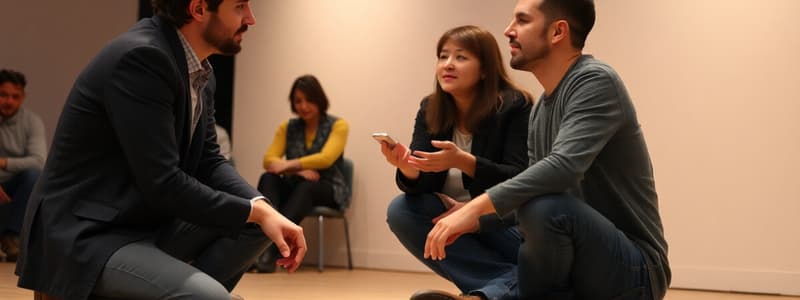Podcast
Questions and Answers
What does 'front stage' refer to in dramaturgical analysis?
What does 'front stage' refer to in dramaturgical analysis?
- The situation in which we misrepresent ourselves
- The area where we relax and act naturally
- The part of life where we are offstage
- The area where the performance is given (correct)
Impression management involves the tactics we use to present ourselves accurately to others.
Impression management involves the tactics we use to present ourselves accurately to others.
True (A)
What is misrepresentation in the context of social interactions?
What is misrepresentation in the context of social interactions?
Knowingly presenting a false version of ourselves.
The process of interpreting and performing in a way that matches a scenario is known as ______.
The process of interpreting and performing in a way that matches a scenario is known as ______.
Match the following terms with their definitions:
Match the following terms with their definitions:
Which of the following describes 'tact' in impression management?
Which of the following describes 'tact' in impression management?
The looking-glass self refers to how we perceive ourselves based on how others view us.
The looking-glass self refers to how we perceive ourselves based on how others view us.
What term describes the process of preparing for future life roles by observing others?
What term describes the process of preparing for future life roles by observing others?
Symbolic interactionism focuses on the meanings and symbols that arise through social interactions.
Symbolic interactionism focuses on the meanings and symbols that arise through social interactions.
What does the Looking-glass Self refer to in terms of self-identity?
What does the Looking-glass Self refer to in terms of self-identity?
In Goffman's Dramaturgical Analysis, individuals are seen as ____ performing their roles in everyday life.
In Goffman's Dramaturgical Analysis, individuals are seen as ____ performing their roles in everyday life.
Match the following concepts with their descriptions:
Match the following concepts with their descriptions:
What does Symbolic Interactionism primarily focus on?
What does Symbolic Interactionism primarily focus on?
The self is developed independently of social interactions.
The self is developed independently of social interactions.
Who introduced the concept of the Looking-Glass Self?
Who introduced the concept of the Looking-Glass Self?
According to Goffman, the process of managing one's impressions in social interactions is known as _____ management.
According to Goffman, the process of managing one's impressions in social interactions is known as _____ management.
Match the theorist to their concept:
Match the theorist to their concept:
Which of the following is NOT considered a factor in the development of self according to Symbolic Interactionism?
Which of the following is NOT considered a factor in the development of self according to Symbolic Interactionism?
According to the Looking-Glass Self, the perception of others' responses can influence an individual's sense of self.
According to the Looking-Glass Self, the perception of others' responses can influence an individual's sense of self.
What role does agency play in the development of the self?
What role does agency play in the development of the self?
Interactionists emphasize the importance of _____ in understanding social relationships.
Interactionists emphasize the importance of _____ in understanding social relationships.
What aspect does Erving Goffman's dramaturgical analysis primarily examine?
What aspect does Erving Goffman's dramaturgical analysis primarily examine?
Flashcards are hidden until you start studying
Study Notes
Theatrical Nature of Social Interaction
- Social interaction is similar to theatre.
- We take on a status, perform a "role," are surrounded by "props," and our success depends on the "audience."
- We follow a "script" with room for improvisation, and participate in various scenarios on different "stages" throughout our lives.
5 Core Elements of Dramaturgy
- Frontstage/Backstage: The front stage is where we perform, while the backstage is where we prepare and relax.
- Impression Management: The conscious effort to create specific impressions in the minds of others using manners, appearance, speech, and nonverbal cues.
- Tact: Impression management on behalf of others to help them save face.
- Definition of the Situation & Misidentification: The ability to interpret and perform in a way that suits a particular scenario. Misidentification occurs when we fail to interpret and perform appropriately.
- Misrepresentation: Knowingly presenting a false version of ourselves.
- Idealization: Exaggerating our value, morality, competencies, and intelligence to impress others.
Symbolic Interactionism
- A micro-theory of society focusing on everyday social interactions, particularly the use of language and norms.
- Seeks to understand how our self is developed through socialization and social interaction.
The Self
- A distinct sense of identity shaped by "nurture" rather than "nature."
- The self is social and influenced by: status, role, historical context, and social interaction.
- We have agency: the ability to reflect, make decisions, and act despite social constraints.
Looking-Glass Self (Charles Horton Cooley)
- Our sense of self is shaped by how we imagine we appear to others and react to those perceptions, even if inaccurate.
- Our sense of self is dependent on social relations.
Erving Goffman and Dramaturgical Analysis
- Goffman studied how individuals create a favorable impression for themselves through social interaction.
- He emphasized the importance of understanding the "front" and "back" stages of social interaction and the strategic ways people manage their impressions to achieve desired outcomes.
Studying That Suits You
Use AI to generate personalized quizzes and flashcards to suit your learning preferences.




